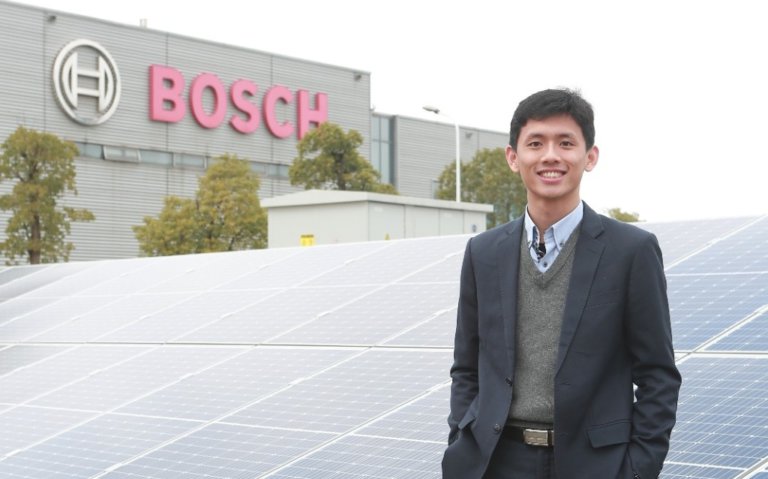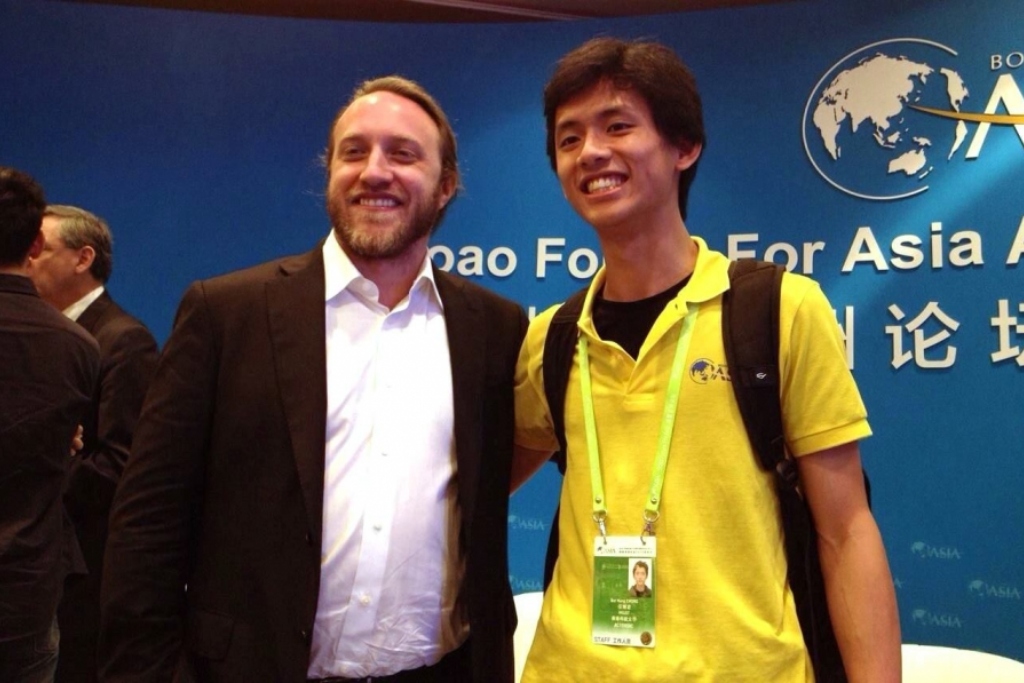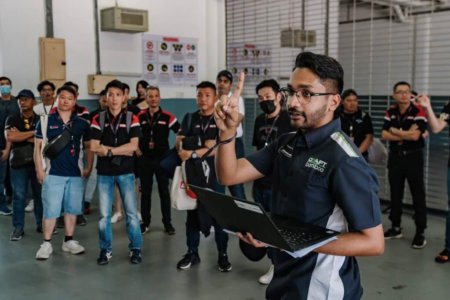
Growing up, Bor Hung Chong did not know he would one day become a green leader in less than a decade after university.
Further still was the idea that he would go on to close multi-million dollar contracts with Fortune 500 companies.
Chong did, however, have some practice on how to become a leader — one that would be consequential in turning him from employee to employer not long after graduating university.
For a school project in Grade 10, the Malaysian created a business plan to open a store selling suits in a nearby shopping mall.
He reached out to a business teacher to mentor him, conducted in-depth research, and wrote a detailed plan.
Such attention to detail is all thanks to his passion for physics and business.
“I was drawn to physics because I was interested in the natural laws that govern the universe and business because of how much it runs the world,” Chong shares.
“While I was interested in pursuing physics as a degree, my parents, who were both engineers, weren’t too keen on its career prospects.”
Seeing how computer engineering and business management were fast growing while he was in high school, he joined a dual degree in both fields.
It was offered by the Hong Kong University of Science and Technology (HKUST), with his first year funded by a scholarship.
Today, Chong is managing director and head of business development at Nefin Group, a green independent power producer (IPP) offering carbon-neutral technologies and financing solutions in the Asia-Pacific region.
He assumed the role in 2023 after joining the company back when it was a startup in 2014. T
We caught up with him to learn more about his background as an international student, his time at HKUST, and his journey to becoming a leader:

Apart from growing up in Malaysia, Chong also lived in Germany, China, and Hong Kong. Source: AFP
Tell us more about your academic background.
At eight, my family moved to Germany for two years because of my father’s work. There, I studied at an international school, where I got my exposure to international education.
Because of this, I was always much stronger in English and weaker in the local subjects. When I moved back to Malaysia, I realised that I wasn’t particularly fluent in Malay since I identified myself more as an international student because of my educational background.
I stayed in Malaysia until I was 13 or 14 before moving to China for my father’s work, so I studied at an international school in Suzhou for my high school education. I took the IB programme and did pretty well.
As you’ve mentioned, I did a dual degree in computer engineering and business management at HKUST. After that, I joined NEFIN, where I’m currently working as a managing director and head of business development.
While working at NEFIN, I learned about the Schwartzman Scholars Programme. I took an interest and applied for it.
The whole application process took about a year. So, after three years of working, I continued to pursue a master’s as a Schwartzman Scholar at Tsinghua University.
Why did you choose computer engineering and business management?
I made the best out of the opportunities I was presented with.
In high school, I was very interested in two subjects in which I did well: physics and business. I was drawn to physics because I was interested in the natural laws that govern the universe and business because of how much of the way that the world runs is business-driven.
At the time, I was interested in going to university to study physics, but from a more practical point of view a discussion with my parents — who are both engineers — prompted me to consider engineering since the career prospects were wider.
Later, I got to know about the dual degree programme at HKUST and was also offered a full scholarship for my first year. With that, I decided to venture into computer engineering and business management.
You might ask, ‘Why computer engineering?’ Simply because upon doing research on HKUST, I found out that computer engineering was one of the more challenging programmes. Plus, computer science or computer engineering is a growing field from an international point of view.
In terms of the dual degree itself, we did courses related to both degrees in parallel. I would go to engineering classes in the morning and hop into a business or statistics class in the afternoon.
At the time, all my engineering courses became electives for my business and vice versa. So, instead of completing my degree in three years, it took me four years since I had more classes than my peers.

Chong (pictured on the right) represented HKUST as a volunteer at the Boao Forum for Asia 2015, where he met Chad Hurley, the co-founder of YouTube, whose entrepreneurial spirit inspired him to take risks and build his career in start-up. Source: Bor Hung Chong
What did you enjoy most about studying in Hong Kong?
I really enjoyed and appreciated the education and diverse exposure I got at HKUST.
A big part of my going to NEFIN, which was a startup at that time, has to do with the exposure I had at HKUST since they really pushed us to get comfortable with entrepreneurship.
The quality of education at HKUST was also second to none.
I made friends with a few international friends with whom I still keep in contact. Most recently, I went to one of my friend’s weddings in Thailand.
While we may not talk as much, I still appreciate the fact that we can maintain a good relationship until now and be able to meet up once every one or two years.
Lastly, it concerns the physical environment. As a Malaysian, I struggled to adapt to the city centre in Hong Kong.
Given that HKUST was situated away from the city and close to the ocean, that environment worked for me and allowed me to adapt to Hong Kong in a more progressive way.
What were some of the challenges you faced as an international student that taught you how to become a leader?
As an international student, I think one of the biggest challenges in Hong Kong, even though it’s an international city with a strong local culture, is that it’s much harder to get closer to my Hong Kong friends than my Malay or Chinese friends, who are much more used to a more much more diverse demographic of people.
I’ve mean, I’ve come a long way — my wife is a Hong Konger as well. But, in the beginning, being able to enter the social circles of local Hong Kong was a challenge as an international student.
Secondly, most Hong Kong universities are very career-driven. There’s a very competitive kind of environment where everyone is thinking about their career after graduation, which is good.
That indicates the chance of you having a good job and the focus on having a great start to your career. It took me quite a while to get used to that kind of thinking.

Nefin provides carbon neutrality solutions to commercial and industrial customers. They provide green energy solutions to help multinational companies decarbonize their operations. Source: AFP
How did you end up working at NEFIN?
Throughout my time at HKUST, I interned at various companies. I was at Bosch China in their electric control unit R&D (research and development) division, CISCO, and Sembcorp Marine.
The experience at Sembcorp was super traditional as a business, and that drove me to try something completely different once I graduated.
During my final year, I got to know the current CEO and founder of NEFIN.
There was a part-time job opportunity for someone who wanted to start the company and they were looking to hire a university student to help him write a business plan.
Given my interest in business and the fact that I was writing business in high school, I linked up with the founder and told him that I knew the ins and outs of writing a business plan — so I was hired on the spot.
That was back in December of 2014 when I started working with NEFIN.
While I did get a couple of offers from large companies like HSBC and IBM, I decided to try and co-found a startup, which was NEFIN.
When we first started, it was a business plan to do some R&D and consulting — which was what we did.
After I graduated, we got a small office at the Incubating Centre in Science Park and there were four of us.
At the time, we tried to be an original equipment manufacturer (making a product to be sold by another company under its own name) and created some cleaning products for solar panels.
We were also picking up government consulting projects in Thailand.
Later, I knew some people in Malaysia, moved to the country, and tried to build a business there. The first round, after a year of hard work, nothing happened.
But I managed to build a network of some good partners there. Then, we got the first opportunity to build Intel’s largest solar farm in Malaysia.
From then on, it was about building the company, scaling its operations, and growing together.
Why did you decide to pursue a Master’s in Global Affairs as a Schwarzman Scholar?
I got to know about this programme through a cold email from HKUST saying that this is a master’s programme in China.
For me, the programme is not just about a Master’s of Global Affairs — it is about a programme for foreigners to learn more about policymaking in China and how the country’s government or industrial policies has developed.
I was very interested in learning about this since I was involved in the solar industry in Southeast Asia.
Through my role, I realised that all the suppliers of these companies are Chinese and they have such a massive presence in the industry across the world.
With that, if I wanted to have further growth in the industry, being able to have control over my supply chain is very important.
That means linking up with businesses in China and understanding how they develop.
China has also done very well in policymaking and I wanted to learn more about that.
These two factors drove me to pursue a master’s degree in China, where I could learn more about the supply chain and policy within the country.
If there was a programme that primarily consists of international students in the best university in China, then that would be the right thing for me.
In fact, for my master’s, I only applied for the Schwarzman Scholarship, which was fully funded, and really tailored my application based on that one programme.
Given the competitive acceptance rate, I was proud to be the first Malaysian to be a Schwarzman Scholar.
Did your experience as an international student teach you how to become a leader in the business world?
Now, a lot of my work relates to getting investors in the Philipines and Hong Kong, placing out projects in Malaysia, Thailand, and Singapore, as well as working with a team across regions.
As an international student, I had to learn how to do well in more challenging exams.
I also learned how to adapt and work with people from many regions and cultures. These are my unique skills.










